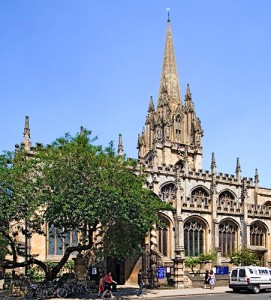 One of my all-time favorite C. S. Lewis quotes—and that’s saying a lot, considering there are so many that could qualify—is found in a sermon he gave called “The Weight of Glory.” He preached this in 1942 at the Oxford Church of St. Mary the Virgin. I’ve been to Oxford only once, but on that brief visit, I entered that church and climbed to the top to see spectacular views of the university below. What transpired in its pulpit, though, in 1942, is far more spectacular. Here is the apex of that particular sermon:
One of my all-time favorite C. S. Lewis quotes—and that’s saying a lot, considering there are so many that could qualify—is found in a sermon he gave called “The Weight of Glory.” He preached this in 1942 at the Oxford Church of St. Mary the Virgin. I’ve been to Oxford only once, but on that brief visit, I entered that church and climbed to the top to see spectacular views of the university below. What transpired in its pulpit, though, in 1942, is far more spectacular. Here is the apex of that particular sermon:
It may be possible for each to think too much of his own potential glory hereafter; it is hardly possible for him to think too often or too deeply about that of his neighbour. The load, or weight, or burden of my neighbour’s glory should be laid on my back, a load so heavy that only humility can carry it, and the backs of the proud will be broken.
It is a serious thing to live in a society of possible gods and goddesses, to remember that the dullest and most uninteresting person you can talk to may one day be a creature which, if you saw it now, you would be strongly tempted to worship, or else a horror and a corruption such as you now meet, if at all, only in a nightmare.
All day long we are, in some degree, helping each other to one or other of these destinations. It is in the light of these overwhelming possibilities, it is with the awe and the circumspection proper to them, that we should conduct all our dealings with one another, all friendships, all loves, all play, all politics.
There are no ordinary people. You have never met a mere mortal. Nations, cultures, arts, civilisations—these are mortal, and their life is to ours as the life of a gnat. But it is immortals whom we joke with, work with, marry, snub, and exploit—immortal horrors or everlasting splendours.
It’s difficult to keep that in mind as we go about our daily interactions with others. Yet it is absolutely true. Believing it to be true, and acting on that belief, would transform relationships.
